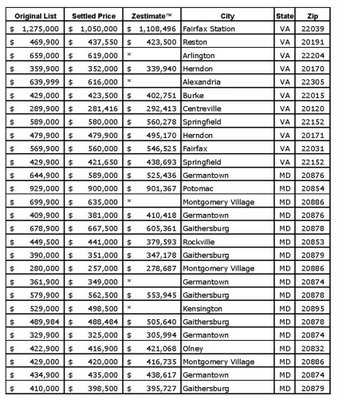I wondered how accurate these estimates (or "Zestimates") could be. I did a quick test using my current DC address. No luck. When I clicked further on my search results, I got the following message, "County transactional data for this home is insufficient so we cannot calculate a Zestimate." I tried another few DC addresses. Turns out, Zillow doesn't have data on recent sales for any addresses in DC.
If you live in DC, Zillow is useless.
I then did a few random searches for properties in Maryland and Virginia and had better luck. But I wanted to try a more scientific approach at ascertaining the accuracy of the data that Zillow was spitting out, so I did a quick search in the MLS for any property in Montgomery County, Arlington County, Alexandria City, and Fairfax County that had settled in the last 48 hours. I then compared the original list price, the final sales price (less any seller contribution), and the Zestimate that Zillow produced for the same addresses. The results are in the chart below (click on the chart for a more readable version):

You'll see that in some instances, Zillow was uncannily accurate. In others, it was way off base. Additionally, in some cases (noted in the chart above by an asterisk in the Zestimate column), Zillow either couldn't locate the property, or couldn't produce a Zestimate at all.
My sense is that in newer neighborhoods where many of the homes were constructed at around the same time and are of similar size, style, and amenities, Zillow will be able to produce a Zestimate that is in line with the actual sales price a seller could expect to realize. Likewise, in neighborhoods where properties were built at different times and have different styles and features (or have been updated at different times), Zillow will have a more difficult time producing an accurate Zestimate.
But guess what. Those issues are the exact same issues that actual human real estate agents must contend with. However, a good real estate agent will have the benefit of being able to see the other listings on the market, know the local pricing customs and strategies, and understand the mindset of the prospective buyers for a particular property.
In the end, any property is worth ONLY what a real, flesh-and-blood purchaser is willing to pay. Period. My advice: if you are looking to buy or sell a house, you may want to try Zillow for fun, but don't necessarily bank on the estimates it provides.
Meanwhile, REALTORS should be prepared to respond to valuation questions from buyers and sellers who have first been to the Zillow site and have their own idea of a property's worth. REALTORS may find themselves in the position, for example, of having to explain why Zillow's valuation missed the mark.
Good REALTORS should have no problem with that.

1 comment:
Not only does this pertain to the National Capital Region, but to New England as well.
Long-established markets (where new/consistent construction is relatively rare) such as Boston are generally not as predictable and more subject to the 'art' of pricing.
It is hard to conceive of a predefined electronic algorithm that could affordably factor all the intangibles which comprise a fair market price.
Cheers to Kevin, once again.
Post a Comment